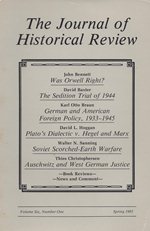A Trial on Trial: The Great Sedition Trial of 1944
A Trial on Trial: The Great Sedition Trial of 1944, by Lawrence Dennis and Maximilian St. George. Torrance, CA: Institute for Historical Review, 1984, 503pp, $11.00, Pb, ISBN 0-939484-20-X About fifteen years ago, in the midst of the raging debate over American involvement in the Indochina War, which I had come to oppose, I wrote…

